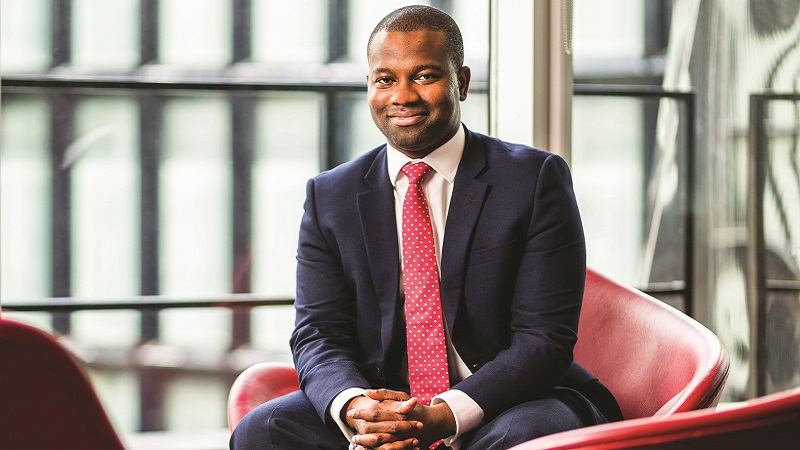In a period of increased economic uncertainty, Legal & General Investment Management’s head of retail investments, Europe, the Middle East and Africa, Justin Onuekwusi, says being diversified and humble are two of the most important qualities in running his multi-asset portfolios.
In February, Onuekwusi was promoted to the newly created role of head of retail investments, having previously held the position of head of retail multi-asset funds. However, while tasked with strengthening and growing the group’s retail investment proposition, he retains responsibility for £8bn in multi-asset funds.
Against a backdrop of surging inflation, rising Covid cases and geopolitical uncertainty stemming from the crisis in Ukraine, he says the overall message when it comes to asset allocation is to diversify. “I have never seen a period where economists as a whole are so uncertain regarding the short-term growth outlook,” he says.
The inflation question
With inflation in the US hitting a 40-year high, Onuekwusi says the time has been reached where rather than constantly trying to predict what is going to happen with inflation, preparing for it in his portfolios is much more important.
“I go back to an old quote that suggests being asked if inflation is likely to prove transitory or persistent feels a bit like being asked if we believe in God,” he says. “We can give an answer, but it would be more based on faith, or lack of it, than analysis.”
Given what Onuekwusi calls the market’s “abysmal” track record in trying to forecast what inflation is going to be, and his lack of faith in this improving, he says the overriding lesson is to be humble.
“Since 2013, the accumulative miss on inflation from the consensus market economists has been over 8%, which is huge,” he says. “In the past few years, you have seen just how far behind the curve the consensus has been, so the lesson is to put our hands up and admit fallibility.”
For Onuekwusi, the only way to build portfolios in this kind of deep-rooted uncertainty is to spread risk over lots of different asset classes. “You can start to build sensible inflation hedges into your portfolios but, given all the uncertainties, you do not want to concentrate your assets into any one particular area.”
Finding balance
So, in conditions where the near-term outlook for growth remains unclear, inflation continues to rise and market volatility is spiking, which assets is Onuekwusi looking to diversify?
“Typically, as a multi-asset manager, you expect bonds to provide protection when equities become more volatile,” he says. “However, in a higher-inflation environment, and given the fact bonds are already on low yields, there is now a huge question mark hanging over whether fixed income can provide any protection at all.”
For example, Onuekwusi points out that last year, and year to date, there has been increased correlation between equities and bonds, which he says poses problems for a balanced multi-asset portfolio.
“In 2021, the correlation was about zero and actually started to turn positive, which is a nightmare for a multi-asset manager,” he adds.
“What can we do about this? Well firstly we can reduce our bond exposure and we can also spread our risk outside of the traditional markets such as the UK and US, into areas like Australia, New Zealand, Canada and South Korea, which are developed markets that typically have higher yields than UK gilts.”
Currency risk
In addition to diversifying his bond exposure, the second thing Onuekwusi says investors can do in a balanced portfolio is to spread currency risk outside of the dollar, euro and yen, which he notes all tend to be more defensive than sterling.
“The UK has a long history of high inflation compared with the rest of the world,” he says. “The 1970s and ’80s show the UK is more susceptible to high levels of inflation, meaning sterling is also susceptible to lose value in global growth shocks.”
As a result, Onuekwusi says spreading risk over different currencies is very important, adding that additional hedges that could be considered are the commodity exporting countries such as Australia, Canada and, for the more adventurous investor, Chile and Peru.
“These are all currencies that should provide a good hedge against commodity inflation,” he says.
When it comes to hedging risks within Onuekwusi’s portfolios, another important factor to consider is the blending of short-term hedges with more longer-term solutions.
Onuekwusi notes, while in recent weeks we have seen significant falls in asset classes such as high yield emerging market debt and emerging market equities, there have been winners as well – namely commodities and infrastructure.
“Up to 70% of the infrastructure universe tends to be linked to inflation, and US inflation-linked bonds have been winners in this space over the past month or so as inflation has started to spike,” he says.
Given the success of these short-term hedges, Onuekwusi says the natural investor reaction is to pile lots of money into these assets. He notes, in the longer term however, commodities don’t historically provide significant growth.
“Any long-term return you expect you will get out of commodities is zero, and they tend to be quite volatile. So, the long-term inflation hedge is probably the equity market. If you invest in equities and companies can pass on the earnings, you should still get a real return that is positive.”
Homing in
If Onuekwusi’s message is to diversify long and short-term hedges, fixed-income portfolios and currency exposures, what is he doing within his equity allocation in current market conditions? The answer is looking close to home.
While currently neutrally weighted in the UK, Onuekwusi says an inflationary environment – particularly commodity inflation – can be a tailwind for UK equities, especially the FTSE 100.
“The UK has a high energy exposure relative to other developed markets,” he says. “However, another interesting dynamic is that if we return to the traditional relationship in which the UK becomes an importer of inflation, sterling will weaken, and we know that a weaker pound is beneficial for FTSE 100 companies because 80% of their earnings come from overseas.”
If inflation continues to spike and it is led by commodities, Onuekwusi believes this could make UK equities a “go-to” asset class for investors.
Looking to the US, Onuekwusi notes, if all equity asset classes are ranked, the US is either number one or two in every single calendar year since 2013, with the exception of 2017.
“The persistency of performance in the US has been incredible,” he says. “In nine of those years it has been the top performer five times and ranked second three times.”
‘Concentration conundrum’
However, as result of this performance, US equities have become a significantly larger allocation of global stock markets, now making up double every other region in standard indices.
“Within the US itself you have had a build-up of concentration risk, in which the top five stocks have gone from 10% of the S&P 500 in 2013 to about 22% today,” he says. “So, over one-fifth of the S&P 500 is now made up of just five stocks, which is truly incredible.”
The problem with this “concentration conundrum” is half of the falls seen in the S&P 500 in January and February this year can be attributed to just seven stocks.
“This is not a diversified index,” he says. “Linked to the diversification case in this uncertain environment, it does make sense to start to spread your risk outside of the US market into other areas.”
While this may be to the detriment of future gains, for Onuekwusi the question of whether the US will continue to be the top-performing region is uncertain, but what is clear is the concentration risk investors need to take to get these returns.
Within the LGIM multi-asset portfolios, Onuekwusi is spreading his risk over different equity markets, so investing more into Europe, the UK and emerging markets.
“From a valuation perspective Europe and emerging markets look particularly attractive, with European equities already pricing in a recession,” he says.
Onuekwusi notes he does have a fiduciary duty to protect people’s pensions and life savings throughout these uncertain times. In terms of emerging markets, despite the valuation case, Onuekwusi says he has recently reduced his conviction in the area.
This is not because of the conflict but rather with regard to the increased level of lockdowns taking place in China as Covid cases have increased again.
“The lockdown policy we are seeing in China, and to some extent in Hong Kong, could have a significant impact on company earnings in the region,” he says. “So even though we like the valuation case, uncertainty is driving us to be more cautious in the region.”
This article first appeared in the April edition of Portfolio Adviser Magazine










